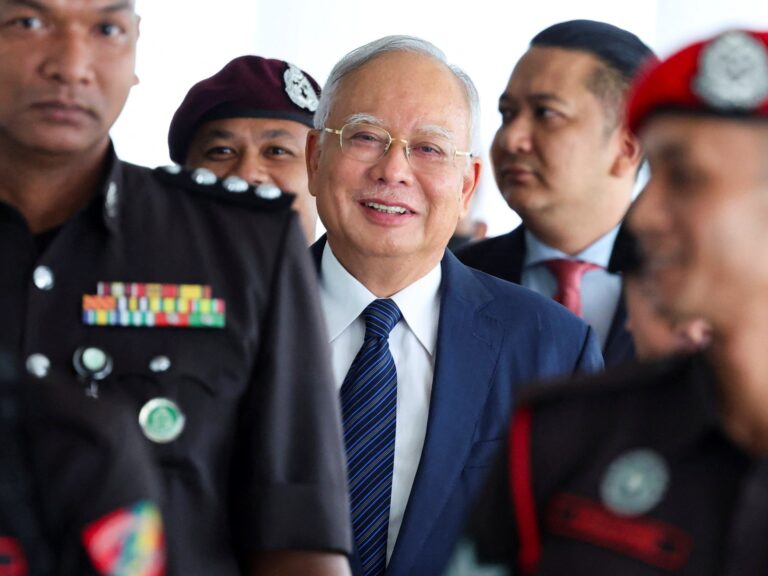The jailed former leader claimed Malaysia’s king had issued a royal order authorising his transfer to house arrest.
A Malaysian court has rejected jailed former prime minister Najib Razak’s request to serve the remainder of his prison sentence under house arrest.
Wednesday’s decision came in response to a judicial review application filed by Najib on April 1, who claimed he had clear information that the then king, Al-Sultan Abdullah Sultan Ahmad Shah, had issued a “supplementary order” allowing him to complete his bribery penalty under house arrest.
Najib claimed the addendum was issued at a January 29 pardon board meeting chaired by Sultan Abdullah, who also reduced his 12-year prison sentence for corruption in the multi-billion dollar 1MDB scandal. by half and significantly reduced a fine.
The former prime minister had asked the court to compel the government to respond or confirm the existence of the royal order, which he said would give him the right to serve the remainder of his term under house arrest and enforce the order if it existed.
In a copy of the judgment released by the Kuala Lumpur High Court on Wednesday, it found there was no arguable case justifying a full hearing on Najib’s application.
Judge Amarjeet Singh described affidavits filed by Malaysian Deputy Prime Minister Ahmad Zahid Hamidi and another senior politician from Najib’s party, saying they had seen a copy of the royal order, as hearsay, and said the government had no legal obligation to respond to the request.
Najib intends to appeal the decision, his lawyer Muhammad Shafee Abdullah told reporters.
“The court said there was no legal obligation, but ethically the government should have responded,” Shafee said.
The pardon board that halved Najib’s sentence was chaired by King Al-Sultan Abdullah Ahmad Shah, whose five-year reign as head of state ended in January. Sultan Abdullah is from Najib’s hometown of Pahang.
In his petition, Najib accused the pardon board, the interior minister, the attorney general and four others of covering up the sultan’s order “in bad faith.”
Interior Minister Saifuddin Nasution Ismail said he was not aware of such an order because he was not a member of the pardon committee. Others named in Najib’s request have not commented publicly.
Shafee said Najib’s claim was not based on rumours but that there was “digital proof” of the amendment, with Commerce Minister Zafrul Aziz taking a picture of the amendment on his mobile phone when Sultan Abdullah informed him about it. He added that the government’s silence also implied that there was such an amendment.
“One thing is clear: no one or any government institution has said that this addendum does not exist. If it does not exist, just say so. If the government dares to say clearly that there is no addendum, we can all go home and sleep,” he said.
Najib was convicted in 2020 of criminal breach of trust and abuse of power for illegally receiving funds embezzled from a unit of state fund 1Malaysia Development Berhad (1MDB).
The verdict was upheld by Malaysia’s highest court in 2022.
Malaysian and US investigators estimate that $4.5 billion was stolen from 1MDB and more than $1 billion was funneled into accounts linked to Najib.
The former prime minister served less than two years of his sentence before it was commuted by the pardon board. His sentence is now due to end on August 23, 2028.
The pardon board did not provide reasons for its decision and was not required to explain itself. But the decision has sparked a public outcry over why Najib appears to be enjoying special privileges over other prisoners.
The Malaysian Bar Association, which represents more than 20,000 lawyers, filed a petition challenging the pardon board’s decision, saying it was illegal, unconstitutional and invalid. It said the decision made a mockery of Najib’s other ongoing criminal cases related to the 1MDB scandal.
The hearing on the Bar’s challenge began this week.


